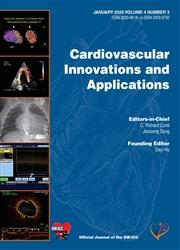Metformin Treatment is Associated with Mortality in Patients with Type 2 Diabetes and Chronic Heart Failure in the Intensive Care Unit: A Retrospective Cohort Study
IF 0.9
4区 医学
Q4 CARDIAC & CARDIOVASCULAR SYSTEMS
引用次数: 0
Abstract
Objective: Patients receiving intensive care often have diabetes mellitus (DM) together with chronic heart failure (CHF). In these patients, the use of metformin in intensive care is controversial. This study was aimed at assessing the mortality rates of patients with DM and CHF treated with metformin. Methods: The Medical Information Mart for Intensive Care database was used to identify patients with type 2 diabetes mellitus (T2DM) and CHF. A 90-day mortality comparison was conducted between patients who were and were not administered metformin. Propensity score matching analysis and multivariable Cox proportional hazard regression were used to ensure the robustness of our results. Results: A total of 2153 patients (180 receiving metformin and 1973 not receiving metformin) with T2DM and CHF were included in the study. The 90-day mortality rates were 30.5% (601/1971) and 5.5% (10/182) in the non-metformin and metformin groups, respectively. In the propensity score matching analyses, metformin use was associated with a 71% lower 90-day mortality (hazard ratio, 0.29; 95% confidence interval, 0.14–0.59; P < 0.001). The results were insensitive to change when sensitivity analyses were performed. Conclusion: Metformin treatment may decrease the mortality risk in critically ill patients with T2DM and CHF in the intensive care unit.二甲双胍治疗与重症监护病房2型糖尿病和慢性心力衰竭患者的死亡率相关:一项回顾性队列研究
目的:接受重症监护的患者常合并糖尿病(DM)和慢性心力衰竭(CHF)。在这些患者中,在重症监护中使用二甲双胍是有争议的。本研究旨在评估二甲双胍治疗DM和CHF患者的死亡率。方法:利用重症监护医学信息集市数据库对2型糖尿病(T2DM)合并CHF患者进行识别。在使用和未使用二甲双胍的患者之间进行了90天死亡率比较。采用倾向评分匹配分析和多变量Cox比例风险回归来确保结果的稳健性。结果:共纳入T2DM合并CHF患者2153例(接受二甲双胍治疗180例,未接受二甲双胍治疗1973例)。非二甲双胍组和二甲双胍组90天死亡率分别为30.5%(601/1971)和5.5%(10/182)。在倾向评分匹配分析中,二甲双胍的使用与90天死亡率降低71%相关(风险比,0.29;95%置信区间为0.14-0.59;P < 0.001)。当进行敏感性分析时,结果对变化不敏感。结论:二甲双胍治疗可降低重症监护病房T2DM合并CHF危重患者的死亡风险。
本文章由计算机程序翻译,如有差异,请以英文原文为准。
求助全文
约1分钟内获得全文
求助全文
来源期刊

Cardiovascular Innovations and Applications
CARDIAC & CARDIOVASCULAR SYSTEMS-
CiteScore
0.80
自引率
20.00%
发文量
222
 求助内容:
求助内容: 应助结果提醒方式:
应助结果提醒方式:


